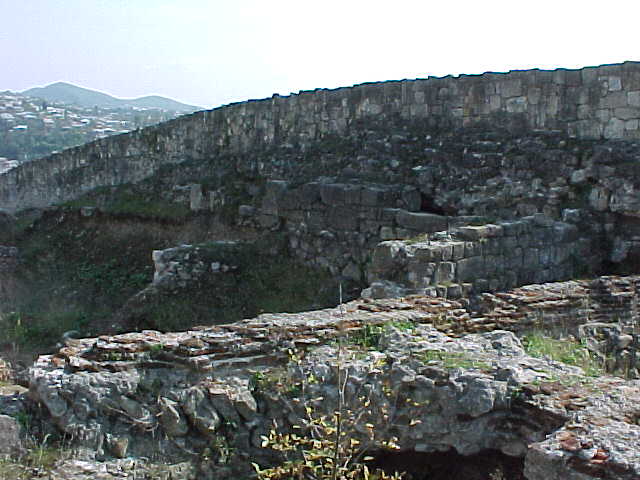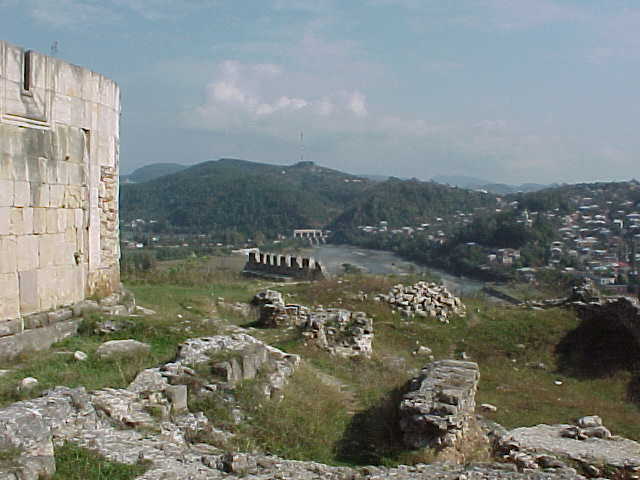October 18—Sunday
Most of us rose between 8:30 and 9:00. I learned that Mother Sidonia wanted to speak to the Metropolitan, and so he decided, since she was free and he was too, to speak before Liturgy. She talked and talked, and somehow finished what she had to say right when the Metropolitan had to go to Liturgy, which was to begin at 9:30. Many villagers came for the service. It was a very nice Liturgy; at the sermon, I translated from English into Russian, and Fr. George from Russian into Georgian. During the clergy’s communion, Fr. George came out and told the people about the Patriarchate’s latest declaration and the meaning of it all. Some of the women excitedly began making exclamations and asking what seemed to be serious questions. After Liturgy, we had lunch and got ready to depart for Kutaisi. Fr. Zurab had a flat tire and they put on the spare.
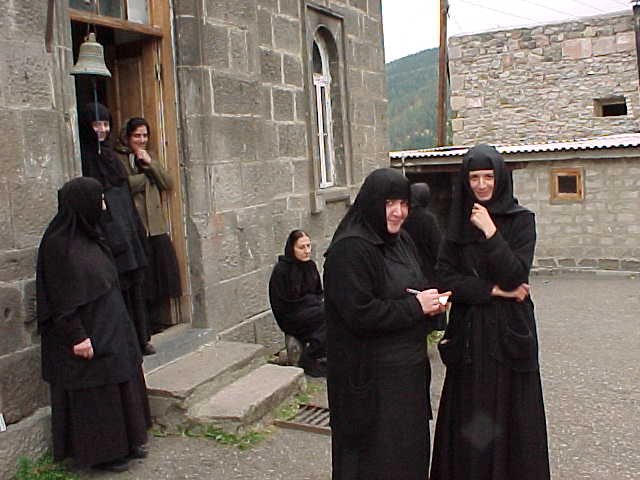
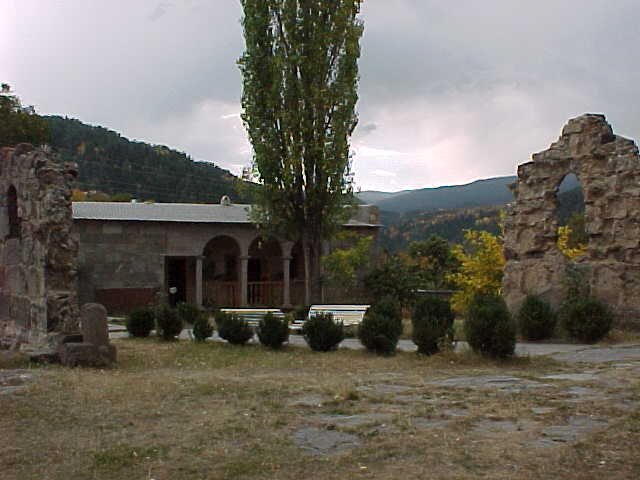
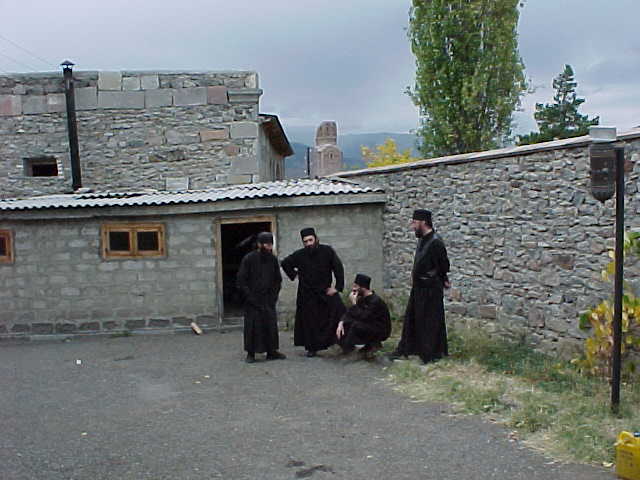
We arrived at Kutaisi at about 8:00. We were supposed to be there at 6:00, but because of the delays with the flat tires etc., we were late. We met the men we were supposed to see at one square in Kutaisi, and then from there we all played follow the leader to the apartment where we were to stay the night. When we arrived, we sat a while, then sat down to eat, and we had our discussion at the table. We were very impressed with the knowledge these men possess of what the Church is supposed to be, even theological details. They are all very sincere and are very concerned about worshipping God in truth, and they understand very well what constitutes the true Church and what it is supposed to be. They posed some very intelligent questions, which Metropolitan Ephraim answered very well (as far as I could tell). In any case they seemed pleased.
We were fed abundantly as usual. Our host was a young man by the name of George. His wife’s name is Natalia. We sat there probably till about 11:00, and then everyone dispersed little by little. The Metropolitan, Fr. Andrew, myself, Fr. Otari, and Fr. George stayed at George’s apart-ment, and the others went elsewhere. I got into a conversation with one other young man for a while. He wanted to talk a little, since he would not be seeing us the next day. A little later, our host asked if he could talk with me for a bit, and we went into the next apartment where he was staying, and he and his nephew David and I sat and talked until 3:00 a.m. Needless to say, I was very tired the next morning. They had a million questions simply about basic things.
I stayed in the same room with Fr. Andrew, and he, the poor thing, was feeling very unwell; he had a fever. Neither he nor I hardly slept that night, which added all the more to my fatigue. Anyway, we rose about 8:15. George made us some breakfast, actually, leftovers from the night before. While we were eating, some helicopters flew overhead. George looked a little concerned and said that he had heard on the radio that a group called the "patriots" had seized eight tanks and were moving in on Kutaisi. But he came to the conclusion that there would be no trouble by the time we left Kutaisi that afternoon.
Eventually the other clergy and some of the faithful from there gathered and we took leave of our host, who gifted me an icon of St. George. He was unable to accompany us, and we departed with the rest of the men. We stopped at one place to get some parts for Fr. George’s car and then proceeded on to Gelati Monastery, where St. David the Builder is buried. This is located outside the city in the mountains. As we approached the monastery, we heard them ringing the bells. We were not a little surprised, and figured there must be some sort of mistake. Well, it was a mistake—they thought we were their Metropolitan, since Fr. George’s car is very much like his. When we got out and entered the monastery, there was someone who looked like a novice, but hair and beard nicely trimmed. He took our Metropolitan’s blessing and greeted me as clergy usually do (kissing each other on the shoulder). We went into the church and venerated the icons and marvelled at the frescoes that were still in relatively good condition. I took a few shots with the video. Then we went up to a lady who was sitting in one corner in the back—she was obviously there to hand out pamphlets etc.—and we gave her a box of incense. She had a look on her face that gave one to understand that she wasn’t happy to see us at all. For sure she knew who we were. She wouldn’t even take the incense from our hands, but simply pointed to the table to put it down there. We then went out into the court and over to the old gates which used to lead into the monastery. It is right there that St. David’s tomb is. He had given orders to have his body buried right there where everyone would walk over his grave. I understand that his relics were removed and placed in some other church. Our companions told us that his height was the same as the length of the tombstone. He was really tall! They say he was taller than Peter the Great (6’7")!
From there we went around the back of the main church, took a couple group pictures and went out. Fr. George tarried a little, and when he came out, he said that they were looking from inside the church to see if we had left yet.
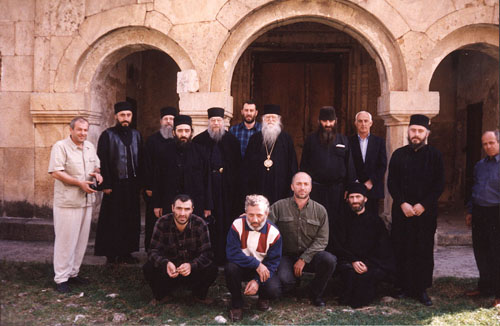
From there we went to Bagrati, a cathedral that was blown up by evil people. It is a beloved place of the Kutaisians, and was the largest cathedral in all of Georgia. It has many interesting ruins and foundations of old buildings and a fortress around it. While I was lagging behind and taking videos, I noticed Fr. Otari walking with an elderly woman, who turns out to be of the family that has been caretaker of this place for many generations. At one point I saw her go up to him and kiss him. He later told me that it turns out she used to live right next door to them when he and his family lived in Kutaisi (Fr. Otari was born there—his whole family is from there; they moved to Tbilisi when he was still very young).
